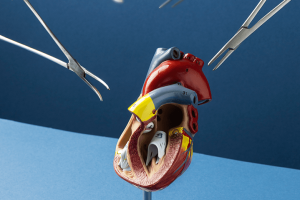The heart never takes a break. The heart is a strong muscle that never stops exercising, not for a minute. Every minute it needs blood, nourishment and oxygen. At Amarillo Heart Institute, we understand the importance of keeping your heart healthy and functioning at its best. We believe that a healthy heart is the foundation of a healthy life, and our goal is to provide you with all you need to achieve optimal heart health, a happier heart.
Mitral Valve Repair & Mitral clip
Mitral valve repair is a surgical procedure that is performed to treat a condition known as mitral valve regurgitation, which occurs when the mitral valve in the heart doesn’t close properly, allowing blood to flow back into the left atrium instead of moving forward into the left ventricle. This can lead to a variety of symptoms, including fatigue, shortness of breath, and heart palpitations.
The mitral valve is located between the left atrium and the left ventricle of the heart and has two flaps, or leaflets, that open and close to regulate blood flow. In mitral valve repair surgery, the surgeon works to restore the proper function of these leaflets by repairing or replacing damaged or weakened parts of the valve.

Surgery Techniques of Mitral Valve Repair

Image by macrovector on Freepik
There are several techniques used in mitral valve repair surgery, including:
Annuloplasty: This involves the placement of a ring-like device around the valve to support and stabilize the valve’s structure.
Leaflet repair: This involves repairing or replacing parts of the valve’s leaflets to ensure proper function.
Chordal replacement or reconstruction: This involves replacing the cords that attach the valve’s leaflets to the heart muscle.
Flail leaflet repair: This involves repairing a leaflet that is completely detached from the valve, allowing it to close properly.

Image by macrovector on Freepik
There are several techniques used in mitral valve repair surgery, including:
Annuloplasty: This involves the placement of a ring-like device around the valve to support and stabilize the valve’s structure.
Leaflet repair: This involves repairing or replacing parts of the valve’s leaflets to ensure proper function.
Chordal replacement or reconstruction: This involves replacing the cords that attach the valve’s leaflets to the heart muscle.
Flail leaflet repair: This involves repairing a leaflet that is completely detached from the valve, allowing it to close properly.
Mitral valve repair surgery is generally preferred over mitral valve replacement surgery because it allows the patient to keep their own valve, which has several advantages over an artificial valve, including a lower risk of infection and a decreased need for lifelong anticoagulant therapy.
Recovery from mitral valve repair surgery typically involves a hospital stay of several days to a week, with several weeks of at-home recovery before returning to normal activities. Patients will typically need to take medications to manage pain and prevent blood clots, and will need to follow a specific diet and exercise plan as part of their recovery.
Overall, mitral valve repair surgery is a safe and effective treatment for mitral valve regurgitation, with a high success rate and low risk of complications when performed by an experienced surgeon.
Mitral clip
The clip mitral valve repair procedure, also known as percutaneous mitral valve repair, is a minimally invasive approach to repairing the mitral valve in the heart.
During the procedure, a small clip is attached to the two leaflets of the mitral valve, which helps to reduce the amount of blood that leaks back into the left atrium of the heart. The clip is inserted into the heart through a small incision in the groin and is guided into place using echocardiography.
The clip mitral valve repair procedure is typically used to treat mitral valve regurgitation, which is a condition where blood flows back into the left atrium of the heart when the mitral valve fails to close properly. Mitral valve regurgitation can cause symptoms such as fatigue, shortness of breath, and chest pain, and can eventually lead to heart failure if left untreated.
The clip mitral valve repair procedure is a less invasive alternative to traditional mitral valve surgery, which involves open-heart surgery to repair or replace the mitral valve. Clip mitral valve repair is associated with a shorter recovery time and fewer complications compared to traditional surgery.
It is important to note that the clip mitral valve repair procedure may not be suitable for all patients, and a thorough evaluation by a cardiologist or cardiac surgeon is necessary to determine the best treatment approach for each individual.










